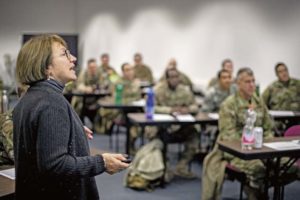
Since 2006, the Department of Defense has increased its emphasis on the mission of building partnership capacity, or BPC. For the 435th Air Ground Operations Wing, BPC is a predominant part of operations.
When thinking of BPC, several elements come to mind: training, mentoring, equipping and exercises. Leadership from the contingency response units within the wing recognized a strategic need which enables the BPC mission: language and culture training.
“Our unit is a little bit different than the other air advisor units because we work in many different countries,” said U.S. Air Force Master Sgt. Daniel Williams, 435th Contingency Response Support Squadron air advisor flight chief. “As air advisors, part of our initial certification is we are required to do 40 hours of language training.”
The Balkans are a hotspot for BPC missions for the wing. Dozens of languages are woven throughout this region, and so leadership chose to focus on a single language closely related to the alphabets they use. Thus, the 435th CRSS hosted a Russian Language Course.
“The course is introducing our Airmen to the Russian alphabet which uses letters from the Cyrillic script, grammar, common phrases and culture,” said U.S. Air Force Capt. Jonathan Soeun, 435th CRSS air advisor and Russian Language Course facilitator. “Cyrillic is used across Eastern Europe. In my personal experience, showcasing something as simple as being able to read Cyrillic has garnered a lot of praise and smiles from our partner nation members. Additionally, Russian is the unofficial language in many former Soviet countries.

“Simply put, while we understand that each of the countries in Eastern Europe have their own cultural identities, they share some similarities with Russia,” Soeun explained. “If we can create a more conducive relationship and environment with these countries, it will allow for greater interoperability and interactions as we further both U.S. and Partner Nation interests.”
Airmen enrolled in the course found learning even the basics of another language beneficial while on missions in the Balkans.
“For me personally, Russian is going to help bolster my knowledge of the Bulgarian language which is going to benefit me when I’m on the road,” Williams said. “It goes a long way when you can take care of the initial pleasantries of greeting your coworkers of a partner nation in their native tongue.”
He described his first experience in Bulgaria to be a bit of a culture shock because it had been a while since he brushed up on his language studies. That changed with the help of language and cultural studies.
“When I was asked to go back a second time, I really focused on making sure that I studied up on my Bulgarian and I refreshed myself on the alphabet,” Williams said. “I noticed there was a big difference when I went back that second time. When I was able to introduce myself with a couple of full sentences in Bulgarian, even though I got a couple pronunciations wrong, I got a pretty warm welcome. I think that sets the tone and helps build rapport a lot faster than if you were to go in not even trying to understand their language and their culture. If you have that trust with each other, you can get after the mission and get to the end state a lot faster.”
Familiarizing Airmen with the language and culture of partner countries is a small decision with large advantages. Such advantages contribute to the bigger Air Force mission, and an even larger DoD mission.
“Sometimes we could be asking for access to that country’s airspace,” Williams added. “Sometimes we need to do in-depth training with them to build their capacity so they can take care of their own business. Working together with our other partner nations and increasing their capacities is huge for us as a nation and a military.”
While the host nation benefits from the knowledge the U.S. military has to offer, it’s not simply a one-way street.
“We learn new ways of doing things, and we learn how to operate within this joint, multinational environment every time we go out on the road,” Williams said.
The language course is but one attempt at sharpening Airmen’s skills. Souen said they are looking into other options to bolster their capabilities.
“Additionally, Ramstein has many Russian speakers,” he said. “We are looking to solicit their help to host informal workshops as another method to reinforce what our students have learned either in class or on their own.
“We are given an opportunity to broaden our horizon as we peer into the culture, politics and military of a near-peer adversary. Partnering this with watching or reading the news on [our near-peer adversary’s] activity, we begin to see and understand the ‘why.’ ‘Why are we doing exercise ‘X’ in this country?’, ‘Why do we have a contingent of military personnel at this location?’, and ‘Why am I here in Germany?’ Having our Airmen think about these questions helps them as they take on the roles of future strategic leaders for our Air Force.”
The second course concluded Dec. 13, but leadership plans to host more in the future.
“As the class reaches its conclusion, the instructor will provide outlets for students to continue self-study,” Souen added. “As we continue to build this capability, we would eventually like to open this up to the other wings at Ramstein.”


